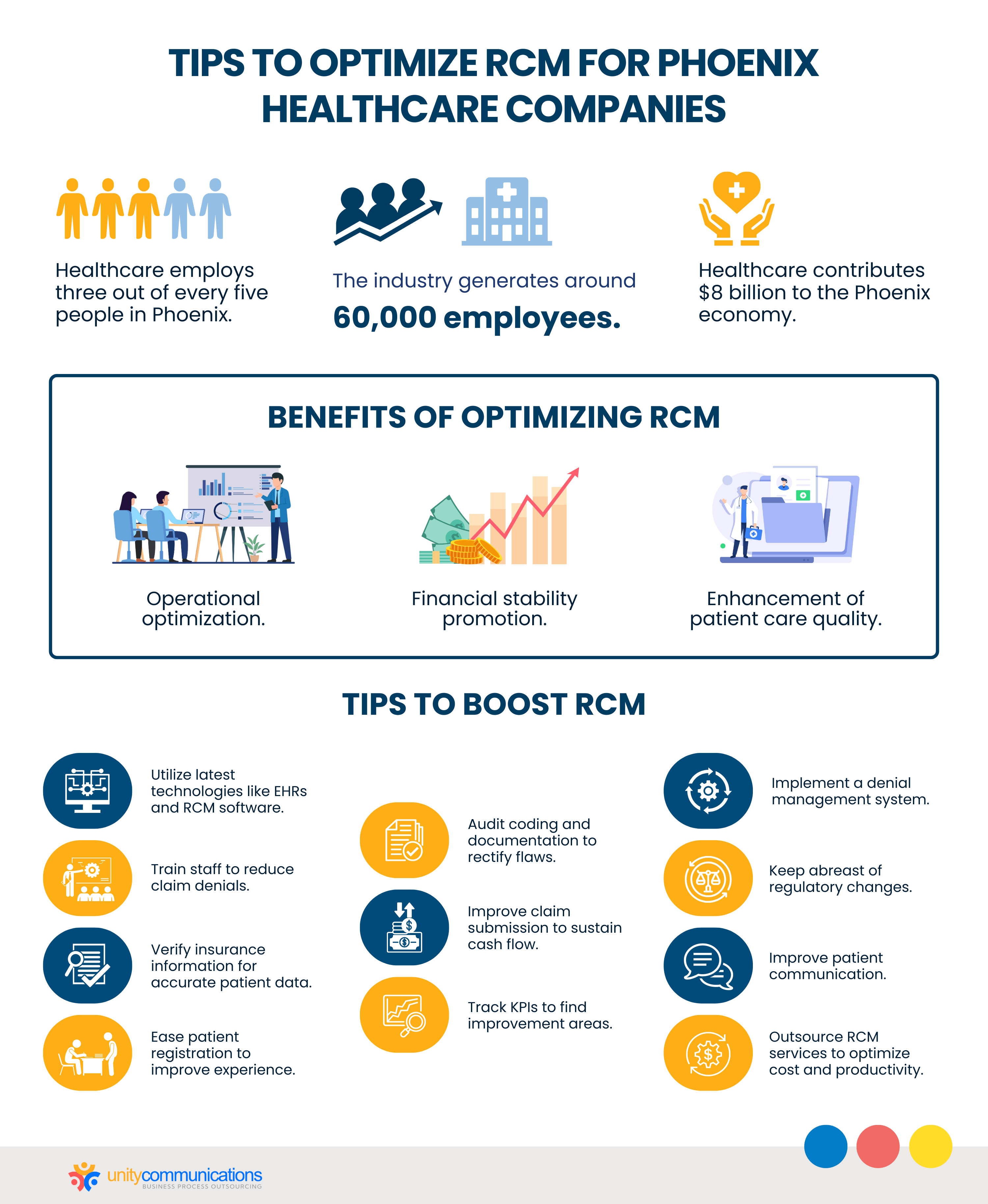Table of Contents
Learn more about outsourcing services for Phoenix businesses. Watch the video below.
A BPO company in Phoenix can help local healthcare providers handle revenue cycle management (RCM) processes, from patient registration and insurance verification to claim processing and payment collection.
Optimizing RCM for Phoenix healthcare companies is essential for enhancing financial stability and patient care quality. Medical organizations must consider the practice in an era of evolving government and industry regulations, rising costs, and increasing patient financial responsibility.
This article explores 11 tips to enhance RCM processes, reduce revenue leakage, and ensure long-term financial success. It also shares valuable pointers on effectively outsourcing RCM operations.
Keep reading to learn more.
Tips to Optimize RCM for Phoenix Healthcare Companies

The Valley of the Sun’s healthcare industry is highly competitive, with major healthcare systems, physician groups, insurance companies, and specialized centers vying for market share and patient loyalty.
In Central Phoenix, healthcare is a vital economic sector. According to a Phoenix Chamber report, healthcare employs three out of every five people in the city. The industry generates around 60,000 employees and contributes $8 billion to the economy.
Optimizing RCM for Phoenix healthcare companies is more crucial than ever. It promotes financial stability, optimizes operations, and enhances patient care quality, allowing medical providers to thrive in an aggressive marketplace.
Follow these helpful tips to boost RCM so your Phoenix healthcare company can stay ahead of the competition.
1. Use the Latest Technologies to Simplify Operations
The healthcare sector continues to evolve, and Phoenix-based organizations can leverage sophisticated technological solutions to streamline RCM operations.
Deploying electronic health records (EHRs) and RCM software can assist in minimizing administrative difficulties and increasing data accuracy and billing efficiency. These technologies also allow for real-time eligibility verification, reducing claim rejections due to incorrect patient information.
2. Train and Educate Staff to Reduce Claim Denials
Effective RCM requires a well-trained and competent crew. Invest in regular training sessions to update staff members on the newest healthcare billing and coding standards.
Certified coders are responsible for ensuring proper coding, which can save money on claim denials. To maintain compliance, encourage the team to remain current on changes to healthcare rules and regulations.
3. Verify Insurance Information for Accurate Patient Data
Accurate insurance verification is the first step in reducing claim denials. Check the patient’s insurance coverage, including deductibles, co-pays, and in-network providers, before administering treatment.
Adopt a strict procedure for updating insurance information during patient visits to ensure accurate data. This preemptive strategy lowers the likelihood of claim rejection due to inaccurate or outdated insurance information.
4. Ease Patient Registration to Improve Individual Experience
The initial stage of RCM for Phoenix healthcare companies is patient registration. Utilizing user-friendly registration forms and processes can help to decrease mistakes and increase data accuracy.
Train your team to verify patient information, such as demographic details and insurance coverage, upon registration, to further avoid future billing concerns. Look into developing technologies for online registration and appointment scheduling to improve the patient experience.
5. Audit Coding and Documentation to Rectify Flaws
RCM success for Phoenix healthcare companies requires accurate coding and adequate documentation. Ensure medical coders are trained in the most recent coding requirements.
Encourage physicians and healthcare professionals to fully and precisely document all treatments since inadequate or confusing documentation can result in claim denials and payment delays. Audit coding and documentation regularly to detect and correct any problems.
6. Improve Claim Submission to Sustain Cash Flow
Maintaining cash flow involves timely and correct claim submission. Build a solid claims filing procedure that includes regular monitoring and tracking. Incorporate automated methods capable of detecting and correcting problems before submitting claims.
Also, establish a follow-up mechanism for pending insurance claims to address them immediately. Consistency and attention to detail can considerably minimize claim denials in this step.
7. Track Key Performance Indicators (KPIs) to Find Improvement Areas
Essential KPIs must be monitored and analyzed regularly to optimize RCM for Phoenix healthcare companies. Accounts receivable days, rejection rate, and first-pass resolution rate are all measures to keep track of.
Studying these KPIs can aid the medical practice in determining areas for improvement and making data-driven decisions to enhance the revenue cycle. To acquire significant insights into financial performance, use healthcare analytics solutions.
8. Implement a Denial Management System to Lower Potential Income Loss
Effective denial management reduces revenue leakage, which is the loss of potential income due to coding errors, claims denials, and inefficiencies in the billing process.
Implement a complete denial management system that records, analyzes, and responds to claim rejections as quickly as possible. Evaluate typical reasons for denials and apply solutions to avoid them in the future. Proactive denial management can considerably increase revenue recovery.
9. Keep Abreast of Regulatory Changes to Maintain Financial Stability
Staying informed about regulatory changes in RCM ensures the compliance of Phoenix healthcare companies with evolving healthcare laws. Adhering to the updates in the Health Insurance Portability and Accountability Act of 1996 (HIPAA) and the Affordable Care Act (ACA) reduces the risk of penalties.
Additionally, understanding reimbursement policies and coding guidelines enables providers to optimize RCM processes, prevent claim denials, and secure proper reimbursement. This provides financial stability and high-quality care in a rapidly changing regulatory landscape.
10. Improve Patient Communication to Accelerate Payment
Effective patient communication is critical to optimizing RCM for Phoenix healthcare companies. It enhances the understanding of financial obligations to facilitate prompt payment and decrease revenue cycle delays.
Ensure patients understand their financial obligations, including co-pays and deductibles, before providing medical services. Give full explanations of bills and several payment alternatives, including online payment portals, so patients can settle their payments more easily. Satisfied and informed patients are more likely to meet their financial responsibilities.
11. Outsource RCM Services to Optimize Cost and Productivity
Delegating specific RCM processes to a healthcare business process outsourcing (BPO) provider can be an ideal solution to optimize cost and productivity for Phoenix healthcare companies.
BPO providers have specialized expertise, advanced technology, and dedicated resources to efficiently handle billing and collections. Medical organizations in Phoenix can outsource claims processing, denial management, medical coding, medical billing, or even the entire revenue cycle if it makes financial sense.
Continue reading to learn how to effectively outsource RCM services.
How to Outsource RCM Services for Phoenix Healthcare Companies

Consider these valuable pointers when employing healthcare BPO services, such as optimized RCM:
- Set clear objectives. Define goals and expectations for outsourcing RCM services. Is the healthcare provider looking to reduce costs, improve efficiency, reduce claim denials, or enhance compliance? Clear objectives will guide its outsourcing strategy.
- Pick the right partner. Select a healthcare process outsourcing partner specializing in RCM with a proven track record and a solid reputation. The BPO provider must understand the specific needs and regulations relevant to Phoenix and the broader U.S. healthcare system.
- Ensure data security and compliance. Ensure the service provider partner adheres to strict data security standards, such as HIPAA and the General Data Protection Regulation (GDPR), to protect patient information. Compliance with healthcare regulations is non-negotiable.
- Establish quality assurance. Implement a robust quality assurance mechanism to check the accuracy and quality of the third-party team’s work. This approach must include regular audits and performance reviews.
- Define clear roles and responsibilities. Identify roles and duties for the internal staff and the third-party team. When outsourcing BPO services for healthcare, the client company and the service provider must know their unique responsibilities and how they integrate into the more extensive RCM process.
- Maintain effective communication. Promote open and transparent communication channels with the BPO partner. Regular meetings, reporting, and feedback sessions are vital for resolving difficulties quickly and staying on track with goals.
- Provide training and integration. Offer the third-party staff the appropriate training on the organization’s procedures, software, and tools. Integrating the BPO team with the in-house workforce is essential for successful collaboration.
- Determine performance metrics and KPIs. The healthcare process in BPO involves defining KPIs and service-level agreements (SLAs) to measure the outsourcing partner’s performance. These metrics must align with the objectives and undergo regular review.
- Encourage continuous improvement. Fostering a culture of improvement is essential when outsourcing RCM services for Phoenix healthcare companies. Assess and adjust the outsourcing plan to adapt to evolving company needs and market demands. Leverage the BPO partner’s expertise for suggestions for improvement.
- Secure data access and control. The healthcare provider must have access to all data and reports the outsourcing partner generates. It must also retain control over critical decision-making processes related to RCM.
- Conduct cost analysis and transparency. Regularly assess the cost-effectiveness of outsourcing compared to in-house operations. Ensure transparency in billing and cost structures provided by the third-party partner.
- Adopt a patient-centric approach. Keep the patient in mind throughout the RCM process. When addressing billing and financial inquiries, the outsourcing partner must appreciate the value of patient satisfaction and interaction.
- Opt for scalability and flexibility. Pick a BPO partner that can scale services to accommodate changes in patient volume or business requirements. The third-party vendor must also provide the correct number of outsourced professionals based on the medical company’s condition and demands.
- Develop disaster recovery and business continuity. Develop a disaster recovery and business continuity plan with the outsourcing partner. The third-party provider must have robust contingency measures to prevent data loss or service interruptions.
- Draft solid legal contracts. Prepare detailed contracts outlining both parties’ conditions, duties, and liabilities. Data security, confidentiality, and dispute resolution must all be addressed in legal outsourcing agreements.
- Ask for feedback and promote relationship management. Maintain a strong and cooperative connection with the service provider. Seek input from both parties regularly to discover development areas and maintain a solid working relationship for the partnership’s long-term success.
The Bottom Line

Optimizing RCM is necessary for healthcare companies in Phoenix to thrive in the dynamic and competitive landscape. It is not merely a financial necessity but a strategic imperative.
Leveraging technology, fostering staff education, ensuring data accuracy, and maintaining compliance with changing regulations bring many advantages to healthcare providers. These include improved financial stability, minimized revenue leakage, and superior patient care.
Proactive RCM strategies, transparent policies, effective communication, and the right BPO partner contribute to long-term success in an evolving healthcare setting.
Let’s connect if you want to learn more about RCM for Phoenix healthcare companies!



